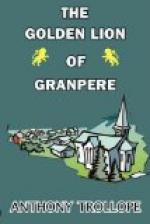‘And so I do. What would you have me say?’
‘Don’t mind petting her, but just be as you would be any other day.’
‘I am as I would be any other day,’ he replied. However, he knew that his wife was right, and was in a certain way aware that if he could only change himself and be another sort of man, he might manage the matter better. He could be fiercely angry, or caressingly affectionate. But he was unable to adopt that safe and golden mean, which his wife recommended. He could not keep himself from interchanging a piteous glance or two with Marie at supper, and put a great deal too much unction into his caress to please Madame Voss, when Marie came to kiss him before she went to bed.
In the mean time Marie was quite aware that it was incumbent on her to determine what she would do. It may be as well to declare at once that she had determined—had determined fully, before her uncle and George had started for their walk up to the wood-cutting. When she was giving them their breakfast that morning her mind was fully made up. She had had the night to lie awake upon it, to think it over, and to realise all that George had told her. It had come to her as quite a new thing that the man whom she worshipped, worshipped her too. While she believed that nobody else loved her;- -when she could tell herself that her fate was nothing to anybody;— as long as it had seemed to her that the world for her must be cold, and hard, and material;—so long could she reconcile to herself, after some painful, dubious fashion, the idea of being the wife either of Adrian Urmand, or of any other man. Some kind of servitude was needful, and if her uncle was decided that she must be banished from his house, the kind of servitude which was proposed to her at Basle would do as well as another. But when she had learned the truth,—a truth so unexpected,—then such servitude became impossible to her. On that morning, when she came down to give the men their breakfast, she had quite determined that let the consequences be




